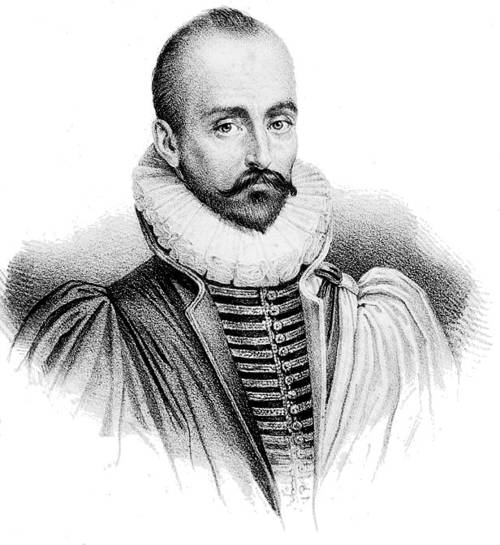
FAQ About Michel de Montaigne

Who was Michel de Montaigne?
Michel de Montaigne was a 16th-century French philosopher, writer, and statesman. He is best known for popularizing the essay as a literary genre. Born in 1533, Montaigne's writings have had a significant influence on both the development of modern philosophy and literature. His works are celebrated for their insightful reflections on human nature, skepticism, and the quest for self-understanding.

What is Michel de Montaigne famous for?
Michel de Montaigne is famous for popularizing the essay as a literary form. His collection of essays, "Essais," is considered one of the most significant works of the French Renaissance, characterized by Montaigne's personal reflections infused with philosophical skepticism and exploration of human psychology and culture.

What are some key themes in Montaigne's essays?
Montaigne's essays often explore themes such as human nature, self-awareness, and skepticism. He delves into human emotions and thoughts, examines the limits of knowledge, and reflects on the experience of living. Through personal anecdotes and philosophical discourse, he questions societal norms and emphasizes individual introspection and personal growth.

How did Michel de Montaigne influence philosophy?
Michel de Montaigne influenced philosophy primarily through his skeptical approach and introspective method, which encouraged readers to question existing knowledge and beliefs. His emphasis on personal experience and observational insight laid the groundwork for modern philosophical thought, influencing thinkers such as Descartes, Nietzsche, and even contemporary existentialists.

What contributions did Montaigne make to literature?
Michel de Montaigne's main contribution to literature was the popularization of the essay as a distinct literary genre. His essays are characterized by a subjective and conversational tone, inviting readers to reflect alongside him. This style opened the door for future writers to explore personal reflection and varied topics within a single narrative voice.

Where was Michel de Montaigne born?
Michel de Montaigne was born on February 28, 1533, in the Château de Montaigne, located near Bordeaux in the southwest region of France. The château had been in his family for several generations, and it was here that he later devoted much of his time to writing his famous essays.

How did Montaigne's upbringing influence his work?
Montaigne's upbringing was unique in that he was raised with Renaissance humanist principles. His father instilled in him a multicultural education, instructing that he learn Latin as a vernacular language, which was uncommon at the time. This early exposure to classical texts and a range of philosophical ideas profoundly influenced his thinking and writing style, fostering a deep intellectual curiosity and openness.

What is Michel de Montaigne's most famous work?
Michel de Montaigne's most famous work is "Essais," a collection of essays that he revised and expanded over the years. Initially published in 1580, "Essais" covers a wide range of topics, offering profound insights into human nature through a blend of anecdotes, philosophical discussion, and personal reflections.

What language did Montaigne write in?
Michel de Montaigne wrote primarily in French. However, his essays also contain quotations and references in Latin, reflecting his classical education and the scholarly norms of his time. His ability to blend these languages reflects his intellectual background and the humanist ideals he adopted.

How did Montaigne's "Essais" change over time?
Montaigne's "Essais" underwent several changes throughout his lifetime. Initially published in 1580, Montaigne revised and expanded the collection with additional essays and reflections in subsequent editions released in 1588 and finally posthumously in 1595. These later revisions reveal Montaigne's evolving thoughts and his engagement with contemporary events.

Why are Montaigne's essays considered significant?
Montaigne's essays are considered significant for their groundbreaking approach to self-exploration and philosophical inquiry. Montaigne utilized the essay format to express personal thoughts and experiences, encouraging readers to think critically and question their own beliefs. His work laid the foundation for introspective writing and set the tone for modern philosophical and literary exploration.

What impact did Montaigne have on the Renaissance?
Michel de Montaigne had a substantial impact on the Renaissance by contributing to the humanist movement, which emphasized individualism and critical inquiry. His essays challenged traditional views and encouraged personal reflection, resonating with the intellectual spirit of the Renaissance, which sought to revive classical learning and explore new ideas about humanity and the world.

Did Montaigne have any political influence?
In addition to his literary and philosophical work, Montaigne was involved in politics. He served as the mayor of Bordeaux from 1581 to 1585, during which he worked to navigate the religious conflicts between Catholics and Protestants. His moderate and tolerant stance reflects his philosophical beliefs and had a stabilizing influence in a time of turmoil.

What were some of Montaigne's views on skepticism?
Montaigne is often associated with philosophical skepticism, as he frequently expressed doubts about human certainty and the reliability of knowledge. In his essays, he employed a questioning approach, suggesting that recognizing the limitations of one's understanding is a path to wisdom. This skeptical stance emphasizes the importance of doubt and inquiry rather than relying on absolute truths.

How did Montaigne's work influence later philosophers?
Montaigne's introspective and skeptical style influenced many later philosophers, including René Descartes, who built on Montaigne's questioning of certainty to develop the method of systematic doubt. His essays also inspired existentialist philosophers like Nietzsche, who valued Montaigne's personal and candid approach to exploring the human condition.

What was Montaigne's relationship with religion?
Michel de Montaigne was a Catholic, but his essays reveal a complex relationship with religion. He often questioned dogmatic beliefs and emphasized tolerance and understanding between different faiths, particularly during the religious conflicts of his time. His writings advocate for a moderate and personal approach to belief, reflective of his broader philosophical skepticism.

Did Montaigne write about his travels?
Yes, Montaigne documented his travels in the "Journal de Voyage," which details his journey through Europe, including Italy, Germany, and Switzerland. This travel journal showcases his observations and reflections on various cultures and practices, providing additional insight into his thoughts and experiences beyond those captured in "Essais."

What innovations did Montaigne bring to essay writing?
Montaigne introduced innovations to essay writing by using a conversational and reflective tone, encouraging personal expression and philosophical inquiry. He moved away from traditional rhetorical forms and instead wrote in a way that was accessible and relatable, inviting readers to share in his introspective journey and encouraging a deeper engagement with the text.

What was the original publication date of Montaigne's "Essais"?
The original publication date of Michel de Montaigne's "Essais" was 1580. The collection comprised two volumes, which he expanded with a third volume in later years, reflecting his continued contemplation and the incorporation of new ideas and experiences into his work.

How are Montaigne's essays relevant today?
Montaigne's essays remain relevant today for their timeless exploration of human nature, personal reflection, and philosophical inquiry. His ability to question established norms and embrace uncertainty resonates with modern readers, as his essays encourage introspection and a deeper understanding of oneself and the complexities of life.
